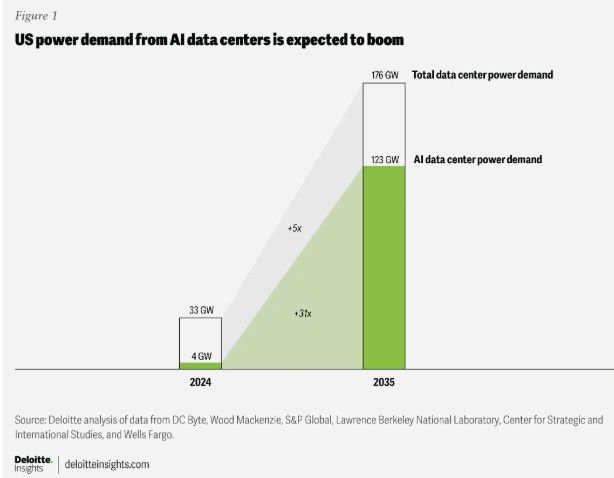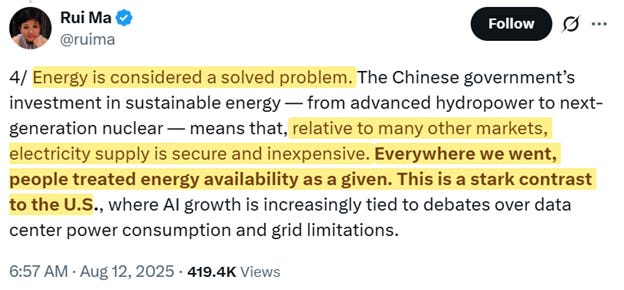This is a transcript, for the YouTube video found here:
Bullets:
Thanks for reading Inside China / Business! Subscribe for free to receive new posts and support my work.
Top AI experts from Silicon Valley were stunned upon seeing China's enormous head start across all segments of applied artificial intelligence.
Of particular concern was China's access to cheap electricity, which is simply not available in the United States, and very likely never coming.
The experts conclude that the AI race is likely already over.
In China, the power demand increases each year by the equivalent of an entire Germany’s worth of electricity consumption. But China's energy supplies are growing much faster, and add two Germany's worth of power annually.
This abundance, which is typical of "overcapacity" of so many other critical building blocks of industry, is the result of a deliberate strategy, executed over decades: Chinese planners develop infrastructure far in advance of when it will be needed.
Report:
Good morning.
Top policymakers in Western countries complain about China’s overcapacity, like it’s a problem the Chinese need to solve. But China sees overcapacity and abundance as the solution to problems, today, and as guarantees that the problems never come.
We have done several reports about our own experiences here in China with AI, and how China’s industrial sector uses AI in powerful ways in design and manufacturing. Artificial Intelligence is used everywhere in Chinese industry, from the mining of raw materials to the finished products that roll out the door on the other side. AI is deeply embedded here in everything, right now.
And that is what the Magnificent 7 companies, and our politicians in the US are also hoping for. But there are huge obstacles in Europe and the United States that need to be overcome.
The biggest bottleneck for building data centers is how much stress they place on the electricity grid. Deloitte surveyed executives in power utilities and Big Data, and they agreed that if the big boom in data center construction was ever going to happen, a lot of new power generation needs to be built, first. If American households don’t like what their power bills look like, lately, when AI data center demand is 4 gigawatts, they’re going to be very unhappy when that demand from AI data centers grows more than 30 times in 10 years, to 123 gigawatts.

We’re saying here that this chart will not happen—it’s impossible, in our political environment—unless the US can generate a lot more electricity than we’re doing now, and to do so at a FASTER rate than demand. It’s only that way that the power bills don’t go up along with that new supply—the supply must race ahead faster than the demand for it. And the entire bull thesis for all these AI and Magnificent 7 stocks depends on this chart of future power demand, which in turn depends on the United States building out its power grid to meet it.
Today, we are not, and we cannot. We don’t have the supply chains to produce the equipment for natural gas power plants, for example. It takes forever to build a nuclear plant, and we don’t even have any under construction in the United States. Solar and wind power are the lowest-cost sources of electricity, and can be deployed quickly at scale, but the Trump Administration killed many of those projects.
In the United States, power is the problem. But in China, power is not a problem. A group of top experts in AI came to China, looked around, and concluded that the race may already be over. Rui Ma runs TechBuzz China, but works in Silicon Valley full time. She came to a big tech conference in Shanghai, went home, and posted what her group saw on their trip to her X account. It is a long report, and here, in part 4—in China, energy is a solved problem.

Electricity supply is secure, cheap. It’s taken for granted. Everywhere she and her group went, energy availability is a given. That’s a stark contrast to the US, where AI growth is already a political problem, and our executives don’t have any idea where the electricity will come from. Or if.
David Fishman is quoted here; he has studied China’s power systems for years. In China, electricity isn’t even a question. The Chinese add more demand that Germany, every year, and yet it’s not a problem. This is what overcapacity looks like, if you’re not Janet Yellen or the EU: decades of deliberate overbuilding and investment, at every node in the industry -- generation, transmission, and future technologies.
As a result, China’s reserve margin has never gone under 80-100% nationwide. It consistently has at least twice the capacity it needs. Every year China’s demand for electricity grows by the equivalent of an Germany’s entire demand. China adds one Germany of electricity demand, and every year China adds two Germany’s of electricity supply.
In the US, that number is 15%, and sometimes less. China operates from a position of abundance, and we do not.
A big reason is the incentive problem. China’s policymakers at all levels, even provincial level and below, build out a lot of infrastructure, long before the demand shows up, because it never will show up unless it’s built. If you’re the mayor, say, of a Chinese city that wants to attract industry years from now, he needs to get busy building out all the infrastructure for it, and that also means power supplies. The overcapacity isn’t a problem to be solved; it’s an approach, a deliberate strategy.
Back home the system is obviously very different. Even for urgent public projects, like utilities, it’s still private investment that gets it built, and private investors demand faster returns. Chinese industrial planners build capacity for demand that they hope will come; we only build for demand that is already there, and when we know our investments will earn big profits.
When it comes to private capital, nobody has more of that than Silicon Valley. But even they have their priorities wrong. Nobody needs this new power more than the Silicon Valley companies themselves—but that’s also long term. They have more interest in upgrading to version 5.0 of something, than in solving the power problem.
Be Good.
Resources and links:
Reuters, Yellen pushes for joint G7 response to China's industrial overcapacity
https://www.reuters.com/markets/yellen-says-us-europe-must-respond-jointly-chinas-industrial-overcapacity-2024-05-21/
Overcapacity: the economic buzzword fuelling Europe’s clash with China
https://www.scmp.com/news/china/diplomacy/article/3315106/overcapacity-economic-buzzword-fuelling-europes-clash-china
Deloitte, Can US infrastructure keep up with the AI economy?
https://www.deloitte.com/us/en/insights/industry/power-and-utilities/data-center-infrastructure-artificial-intelligence.html
TechBuzz China
https://techbuzzchina.com/team/
https://www.lantaugroup.com/people/David+Fishman
https://x.com/ruima/status/1955040979259650267
Fortune, AI experts return from China stunned: The U.S. grid is so weak, the race may already be over
https://fortune.com/2025/08/14/data-centers-china-grid-us-infrastructure/
Magnificent Seven Hit Record $19.6T on AI Surge
https://www.voronoiapp.com/markets/-Magnificent-Seven-Hit-Record-196T-on-AI-Surge-3004
Will we have enough natural gas turbines to power AI data centers?
https://www.marketplace.org/story/2025/05/20/turbine-shortage-slows-new-natural-gas-plant-construction
Number of nuclear reactors under construction worldwide as of June 2025, by country
https://www.statista.com/statistics/513671/number-of-under-construction-nuclear-reactors-worldwide/
Ranked: America’s Cheapest Sources of Electricity in 2024
https://www.motive-power.com/ranked-americas-cheapest-sources-of-electricity-in-2024/
Thanks for reading Inside China / Business! Subscribe for free to receive new posts and support my work.
From Inside China / Business via this RSS feed


